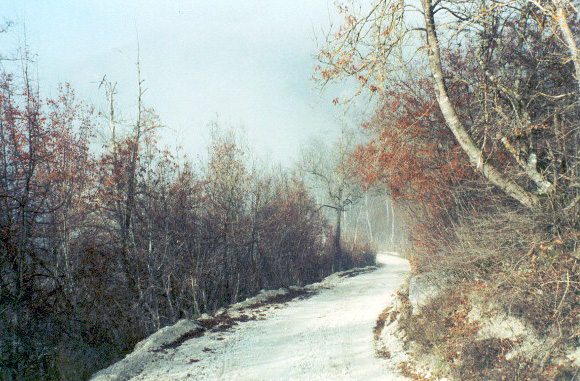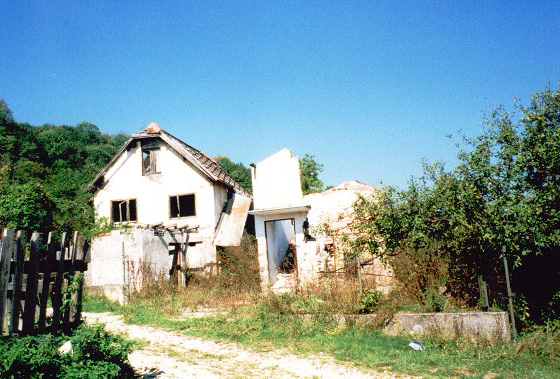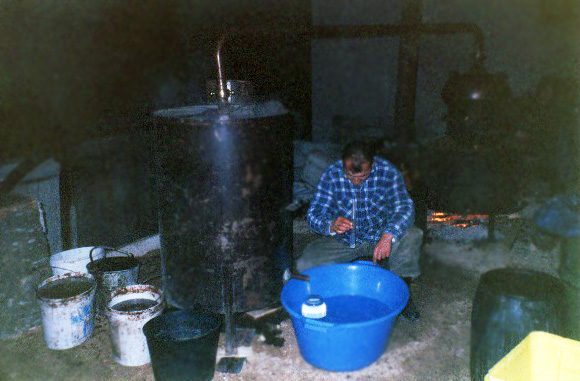The Brandy Making Beekeeper of Bosnia
Article and photo by John Webster

|
|
A winding road through a forest in Bosnia.
|
I am driving alone, and the speedometer says 60 mph, but it feels more like 90 mph as a menacing black Mercedes looms like a cyclone in my rearview mirror. As the chilled early morning mist clears, I see the vague outline of a haphazardly laden timber truck powering towards me, its illicit cargo lurching violently against decaying, wafer-thin restraining straps.
The road is horrendous, a white-knuckle, energy-sapping ride through cavernous potholes and the pulverized remnants of countless stray dogs.
Welcome to Bosnia, a land of jaw-dropping countryside, mountains, valleys, mind-boggling history, welcoming people, and without a doubt, home to the worst drivers on the face of this earth.
The roadside is peppered with an eclectic array of shrines, one of which is so eye-catching that I swerve violently off the road for a closer look. This maneuver draws a prolonged blast from the Mercedes horn and, I imagine, a menacing stare from behind the black-tinted bulletproof glass. I get out and find myself dwarfed by a towering slab of slate grey stone, almost entirely covered in trailing plastic ivy, looped through garlands of equally plastic red roses. A faded, black-and-white Polaroid stares wildly into nothingness from the middle of the battle-scarred stone. The flimsy dressing of cling film will provide scant protection from the relentless savagery of a Balkan winter. My knowledge of the Serbo-Croat tongue is rudimentary at best. Still, amidst the faux fauna, I can make out that Misha was 17 years old when he died and left behind three sisters and a grandmother. His parents were doubtlessly lost in the barbarism that swamped this country in the early 90s.
I rejoin the road, vaguely aware that straying from it in a country that has up to a million unaccounted-for land mines is not the wisest thing I have ever done.
One lane of chaos becomes two as I skirt around Banja Luka, the capital of this northern enclave of the Serbian Republic and now temporary home to countless thousands of displaced souls waiting to see what trauma fate will throw at them next.
It is a bustling city where chic boutiques selling the latest designer gear vie for space alongside hastily erected street cafes, whose simple fare of spicy cevapi (sausage) and fried cabbage, washed down with the locally brewed pivo (beer), are eagerly devoured for a paltry charge. For an extra few pence, the locally grown pickled peppers melt in the mouth. However, the fiendishly hot chili sauce accompaniment is not for the faint-hearted.
The road plows through litter-strewn suburbs before finally leaving the metropolis and descending through a gorge of impossible beauty as it tracks the path of the emerald green Vrabas river, which cascades towards its conflux with the mighty Sava on the Croatian border at Gradiska.
I finally reach my destination: a dilapidated house clinging precariously to the hillside above Sipovo, a pleasant, unspectacular town in central Bosnia. I've come back ten years after my last visit to see old friends and to help out in the annual brandy-making process, which takes place every year in early autumn, as the leaves begin to turn fruit full of juice is plucked from the arching overladen trees.

|
|
A dilapidated house in Bosnia.
|
Pulling up, I see sack loads of plums haphazardly assembled in the barn. Some are battered and bruised, but all are waiting patiently to take their place in some of the most ferociously potent slivovitz imaginable.
From amidst the rotting fruit, Brani appears. He is about 50 but could easily pass for double that age. His face is not so much weather-beaten as just beaten. Yet his eyes, deep-set and almost black, are bursting with life. A former long-distance truck driver, he has an endless supply of sordid tales about life on the road, or at least in the back of his truck.
Spurred on by his stoically loyal wife, he tells them with misty-eyed relish, pausing to replace the ever-present scrawny roll-up glued to his bottom lip. Sacha, his mid-twenties son, is with him, and we are soon reminiscing, warmed by an open fire and a glass of slivovitz.
I make myself scarce as a pig is ceremoniously dispatched, meaning I miss out on an essential part of day-to-day living in these parts. However, the frantic, desperate, high-pitched squeals and subsequent blood gushing under the shed door paint a picture every bit as clear as if I'd witnessed the slaughter firsthand. As a final act of disgrace, the recently departed has a six-foot stake driven through its length before taking pride of place next to the fire, where it will slowly roast for the next six hours as the family begins a ritual that Brani solemnly informs me has remained unchanged for generations.
In the garden below, a dilapidated still is being coaxed into action. A gentle flame licks at a tarnished copper pot, which releases its vapors through a tortured melange of pipes. The resulting nectar fills the country air with pungent fruit. Brani strides towards it. He reaches for one of the tiny shot glasses spread around the still with a hollow hand. Despite having only two good fingers, he clasps it with ease; holding it to the light, he inspects the brandy, finally giving his approval with the faintest nod. Brandy making is a communal affair, and as the morning passes, more and more villagers arrive, ready to proffer advice and offer their services. By mid-afternoon, tasting is in full swing, and pretty soon, makeshift hay beds support those unable to support themselves. As dusk falls, Branko, happy with his day's work, takes his place in his favorite chair at the head of the table. Removing his cigarette, a broad, contented grin spreads across his deeply lined, weather-beaten face, revealing a solitary lower tooth, stained but standing firm.

|
|
A man making brandy in Bosnia.
|
The following morning, I joined Brani to check on his bees. He has five hives in the field below his house, and although the path down is well-trodden, I follow him with some trepidation, mirroring his every step. I've just seen one too many lectures on the dangers of land mines. Sacha sits tending the fire, smiling at my fear. Despite the well-documented evidence, maps, and military reports — not to mention the occasional explosion caused by an errant cow wandering where it shouldn't — Sacha refuses to believe that there are any mines in the area. It always amuses him to see me taking dainty, fairy-like steps whenever I leave the hard standing.
Maybe he knows. After all, he lived through the war. I arrived at a safe time afterward full of pre-conceived ideas all formed courtesy of television news and a few hastily written memoirs.
The bees are oblivious to such worries, as it seems Brani is talking amiably to the several thousand he has within the palm of his hand. They work in perfect harmony, which is my justification for politely refusing his offer of a battered-looking hood and threadbare gauntlets as he tries to coax me closer. The honey he collects provides a valuable source of income in the daily market. Although the way his granddaughters are fingering it down their throats, I suspect this day's takings will be a little lacking.
At the end of my second day, the fire is finally allowed to die, and the last drop of slivovitz is bottled and sealed. The weekend's toil, where upwards of two dozen people have worked continuous shifts through bitterly cold nights, has resulted in 30 liters of pure, unadulterated alcohol, the strength of which is difficult to describe.
As the sun sets on another unblemished autumn sky, we gather together and crack a bottle of the previous year's vintage. In the background, gunfire echoes from the hills, probably just hunters. Nonetheless, it reminds me that the dangers in Bosnia demand respect.
Land mines pose an indefinite threat, as does the ceaseless greed of the black-marketers. Politicians continue to plunder the bottomless coffers of well-meaning, if stunningly naive, donating nations, meaning the infrastructure only functions in some places. There is a minority of hardcore Nationalists who would like nothing better than to turn the clock back fifteen years and plunge the country into murderous chaos once more. But those are negatives. Look hard enough, and you can find danger in anything. Bosnia's risks are manageable, and the rewards for the adventurous far outweigh the possible hazards that might lie in your path or, more significantly, off it.
Bosnia is on the up; if you wait until it reaches the summit, you'll find the hordes have beaten you to the top.
|
